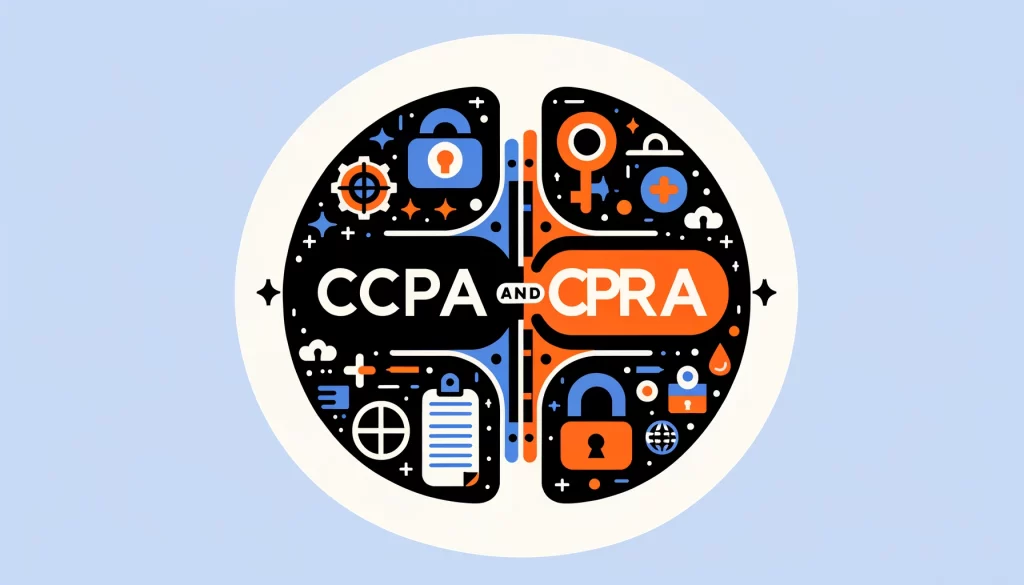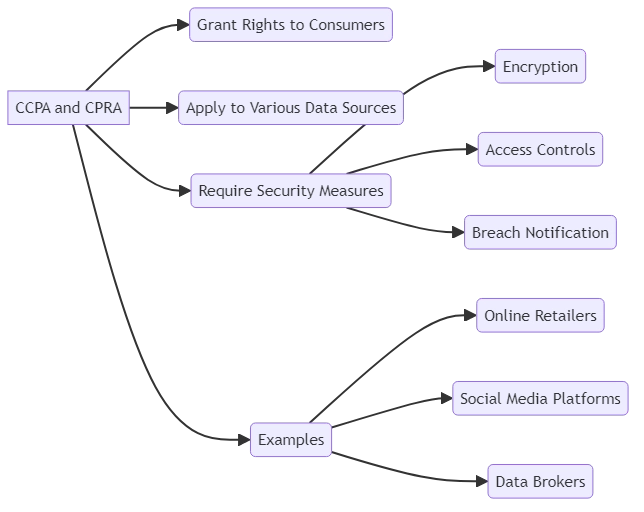
CCPA and CPRA: The Two Most Important Compliances In California

Introduction
In the era of digital transformation, data privacy has become a paramount concern for consumers and businesses alike. Online platforms collect, store, and share personal information. Having strong rules in place is important. The CCPA and CPRA safeguard the rights of consumers.
This article will explain the basics of CCPA and CPRA. The discussion will cover the sources of data they encompass and their security aspects. Additionally, it will provide examples to illustrate how to apply them.
What are CCPA and CPRA?
The California Consumer Privacy Act (CCPA) is a comprehensive data privacy law that took effect on January 1, 2020. It grants California residents various rights concerning their personal information collected by businesses.
Understanding the type of personal data gathered entails these privileges. You also have the option to ask for the removal of your personal data. Additionally, you have the option to choose not to have your personal information sold.
California voters passed the California Privacy Rights Act (CPRA), also known as Proposition 24, in November 2020. It builds upon and expands the protections provided by the CCPA. The CPRA gives people more rights, like fixing wrong personal information and controlling the use of sensitive personal information. It also establishes the California Privacy Protection Agency to enforce privacy regulations.
Sources of Data Covered by CCPA and CPRA
CCPA and CPRA apply to a wide range of data sources that businesses collect and process. These sources include:
- Online interactions: Websites, mobile apps, and online services that collect personal information through user registration, forms, cookies, and tracking technologies.
- Offline interactions: In-store purchases, customer service interactions, and physical forms that collect personal information.
- Third-party data: Personal information obtained from data brokers, marketing partners, and other external sources.
- IoT devices: Data collected from smart devices, wearables, and connected appliances.
- Publicly available information: Personal information gathered from public records, social media profiles, and other publicly accessible sources.
Security Aspects of CCPA and CPRA
Both CCPA and CPRA emphasize the importance of data security. Businesses must implement reasonable security measures to protect consumer personal information from unauthorized access, destruction, use, modification, or disclosure. This includes:

- Encryption: Encrypting personal information both at rest and in transit to prevent unauthorized access.
- Access controls: Implementing strict access controls to ensure that only authorized personnel can access personal information.
- Data minimization: Collecting and retaining only the personal information necessary for specific purposes and deleting it when no longer needed.
- Regular security assessments: Conducting periodic risk assessments and vulnerability scans to identify and address potential security gaps.
- Breach notification: Notifying consumers and relevant authorities if a data breach compromises personal information.
Examples of CCPA and CPRA in Action
To better understand the practical application of CCPA and CPRA, let’s consider a few examples:
Suppose an online retailer collects personal information such as names, addresses, and purchase histories from its customers. Under CCPA and CPRA, the retailer must:
- Provide a privacy policy that clearly outlines the collection, use, and sharing of personal information. The policy needs to clarify what information it collects from users. The sentence should also specify how to utilize this information. Additionally, it should detail who will have access to this information.
- Allow customers to opt-out of the sale of their personal information to third parties.
- Respond to customer requests to access, delete, or correct their personal information within specified timeframes.
- Implement appropriate security measures to protect customer data from unauthorized access or breaches.
A social media platform must comply with CCPA and CPRA rules when gathering user data. This data may include sensitive information like biometric data and geolocation.
- Obtaining explicit consent from users before collecting and processing sensitive personal information.
- Providing users with the ability to limit the use of their sensitive personal information.
- Allowing users to access and download their personal information in a portable format.
- Regularly conducting security audits and assessments to ensure the protection of user data.
A data broker that collects and sells consumer information to third parties must comply with CCPA and CPRA by:
- Registering with the California Attorney General and providing transparency about their data practices.
- Allowing consumers to opt-out of the sale of their personal information.
- Granting customers the privilege to know about the personal data gathered and traded concerning them.
- Implementing robust security measures to safeguard the personal information they possess.
Conclusion
CCPA and CPRA represent significant steps forward in protecting consumer privacy rights in the digital age. Designers created these rules to give people more control over their personal information. They also require businesses to follow stricter rules for keeping data safe and transparent.
DataSunrise offers a comprehensive suite of solutions for businesses in need of exceptional and flexible tools for data management. This includes security, audit rules, masking, and compliance features. DataSunrise helps organizations comply with CCPA and CPRA regulations, while maintaining top-notch data protection standards. Contact our team to schedule an online demonstration and learn how DataSunrise can benefit your business.
